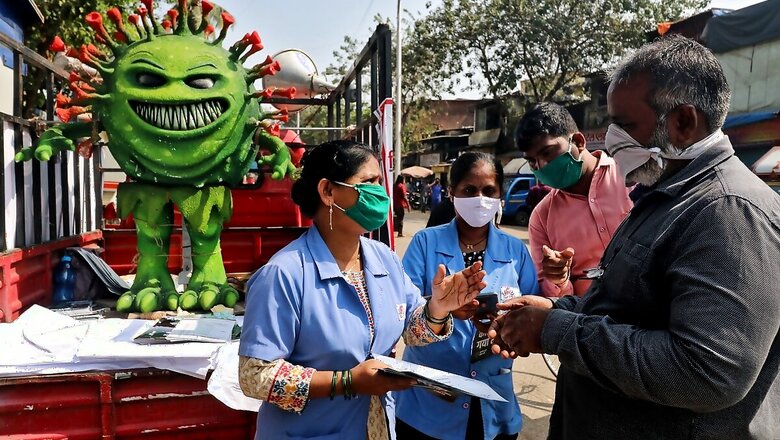
views
The Union Health Ministry on Tuesday said that two variants of the novel coronavirus have been detected in at least three states in India as the country also witnesses an upsurge in the number of infections. According to figures, Maharashtra and Kerala have contributed over 50,000 cases or 75% of the total caseload today. Kerala is responsible for 37.85 per cent of cases, while Maharashtra for 36.87 per cent, the health ministry said. However, the Health Ministry has said that there was no evidence to show that they were responsible for the fresh wave of infections.
Q. Has India detected new variants of coronavirus?
Yes, the Union Health Ministry on Tuesday said that two new variants of the novel coronavirus (SARS-CoV-2) have been found in India — N440K variant and E484K variant.
Q. Are the two new strains specific to India?
No, the variants are neither new nor Indian. “These two virus strains have been detected in other countries too and are not specific to India. Moreover, they have been found earlier in some states in India,” Director-General, ICMR, Dr Balram Bhargava told News18.
Q. In which states of India the two new variants — N440K and E484K– have been found?
These coronavirus variants have been detected in the states of Maharashtra, Kerala and Telangana.
Q. How many new strains of coronavirus have been detected in India so far?
At least 5 variants of coronavirus have been found in India so far. They include N440K variant, E484K variant, and variants from UK, South Africa, Brazil.
Q. Are the new variants responsible for the fresh wave of infection?
The Union Health Ministry on Tuesday said that there was no evidence to show that they were responsible for the fresh wave of infections.
READ | Is Virus Mutation the Reason Behind Amravati Spike? Worried Officials Send Samples for Testing
Q. How many people in India have been found to be infected with the new strains of virus?
India has 194 people infected with the UK, South Africa and Brazil strains, Dr VK Paul, Member (Health), NITI Aayog said on Tuesday. Further, ICMR DG Dr Balram Bhargava said, “The E484Q strain was earlier detected in four sequences in Maharashtra as early as March and July last year. The N440K mutation has been reported on 13 different occasions between May and September 2020 in Telangana, Andhra Pradesh and Assam.”
Q. What do we know about the N440K variant and E484K variant?
Currently, the behaviour of mutations is being constantly and closely watched in the country and 3,500 strains have been sequenced so far, as per Dr Paul. “When we are doing sequencing, we are looking for any abnormal shift in the virus character. We have been watching the mutants. Today, based on the information and as analyzed and understood by a very eminent scientific advisory group of Indian SARS-CoV-2 Genomics Consortium (INSACOG), we would like to underline the fact that we do not see attribution of mutant strains to the upsurge of the infection being seen in some districts. But this is work in progress. We will continue to watch the situation with full responsibility, Paul said. The SARS-CoV-2 Genomics Consortium (INSACOG) was established in December end for laboratory and epidemiological surveillance of circulating strains of SARS-CoV-2 in the country,” he said.
The name E484K, in layman’s terms, is like map coordinates. The number 484 is the exact location of the mutation, the letter E is the amino acid that it was originally and the letter K is the amino acid that it has mutated to.
ALSO READ | Coronavirus Variants with Two Specific Mutations May Evade Antibodies, Says Virologist Shahid Jameel
Q. What do we know about the UK variant of coronavirus?
The UK or Kent variant (B.1.1.7) of the virus was found to be upto 70 per cent more transmissible and may be associated with an increased risk of death compared to other variants. However, more studies are needed to confirm this. It has already been reported by Denmark, Netherlands, Australia, Italy, Sweden, France, Spain, Switzerland, Germany, Canada, Japan, Lebanon and Singapore.
Q. What do we know about South African variant of Covid-19?
The South African variant (501Y.V2 or B.1.351) of coronavirus was first reported in December 2020. It is different from the Covid-19 (SARS-Cov- 2) virus in several ways including its spike protein which enables the virus entry into a body. Much like the new UK variant, the new strain is said to have high transmissibility, meaning it spreads quickly. While previous reports stated that the South African variant was not known to be more potent or fatal than Covid-19 and that it impacted older persons more, new reports find younger persons to be more susceptible to the South African variant.
Q. What do we know about Brazilian variant of the coronavirus?
The Brazil variant (P.1) emerged in July and has this E484K mutation too. Like the UK and South African variants, the Brazil variant could be much more contagious. It may have the ability to evade antibodies.
Q. What does mutation mean?
Mutation refers to a change in the genetic sequence of the virus which occurs as a result of its reproduction. The virus spreads by attaching itself to a host cell and injecting its genetic material into the cell. However, when the host tries to fight this reproduction, the virus finds new ways to survive, thereby adapting and evolving.
Q. How can we keep ourselves safe?
Measures such as washing your hands, keeping your distance from other people and wearing a face covering will still help prevent infections. As the new variants appear to spread more easily it becomes important to be more careful than before.
Read all the Latest News, Breaking News and Coronavirus News here



















Comments
0 comment